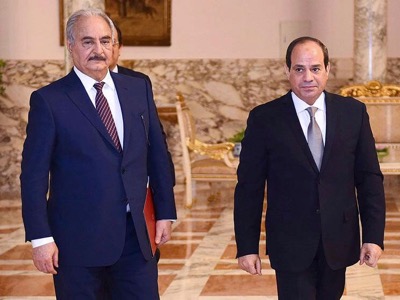
Highlights of the proposed initiative
Objectives
1. The initiative affirms the unity, territorial integrity and independence of Libya, and respect for all international efforts and initiatives and the relevant Security Council resolutions. It calls for compliance with a ceasefire to begin at 0600 hours on 8 June 2020.
2. The initiative is based primarily on the outcomes of the Berlin summit, which resulted in a comprehensive political solution that includes clear implementing steps for the political, security and economic tracks, and respect for human rights and international humanitarian law. It builds on the consensus that emerged at the Berlin conference among the leaders of the States concerned with the Libyan crisis.
3. The 5+5 Libyan Joint Military Commission in Geneva should complete its work under the auspices of the United Nations. The success of the political, security and economic tracks depends on it. It is crucial for the United Nations and the international community to compel all foreign actors to remove foreign mercenaries from all Libyan territory and to dismantle and disarm the militias so that the armed forces (the Libyan National Army), in cooperation with the security services, can carry out its military and security responsibilities in the country.
4. Efforts should be made to restore control to the Libyan State over its national institutions while identifying a suitable national mechanism for reviving the political process under the auspices of the United Nations and building on the efforts of the international community to resolve the Libyan crisis.
5. State control should be restored over all security institutions. The military institution (the Libyan National Army) should be supported. The national army should assume its responsibilities for combating terrorism and play its role, in cooperation with the security and police agencies, in protecting Libyan sovereignty and restoring security on sea, air and land.
6. The Presidency Council should render decisions by majority, with the exception of sovereign decisions concerning the armed forces. In such cases, decisions about proposals submitted by the commander of the armed forces should be unanimous and be taken in the presence of the commander of the armed forces.
The main themes of the initiative
7. Each of the three regions – the eastern region, the western region and the southern region – will form an electoral body consisting of members of the House of Representatives and the Council of State representing each region, and tribal sheikhs and notables. Care should be taken to ensure acceptable representation of women and young people, and include major political figures from the intelligentsia and the unions. The three bodies will meet under United Nations auspices, and will be formed on the basis of consensus. Each region will be responsible for selecting its representative by consensus or election. This should occur within 90 days.
8. Each region will select its representative for the Presidency Council, as well as a qualified Libyan national for Deputy Prime Minister. The Presidency Council will consist of a President and two Vice-Presidents. The Presidency Council will then name a Prime Minister, who in turn, along with his two Deputies, will form a Government and present it to the Presidency Council, in preparation for submission to the House of Representatives for a vote of confidence.
9. The United Nations will oversee the electoral bodies to ensure the integrity of the process of selecting candidates for the Presidency Council.
10. Each region will be awarded a number of ministerial portfolios proportional to its population, once agreement has been reached on the members of the new Presidency Council and the Prime Minister has been named. No region shall have more than one head of one of the three major bodies: the Presidency Council, the House of Representatives and the Council of Ministers. The Tripolitania region will receive nine ministries, the Cyrenaica (Barqah) region will receive seven ministries, and the Fezzan region will receive five ministries. The six sovereign ministries will be divided evenly among the three regions (two ministries for each region), with two deputies for each minister appointed from the other two regions.
11. The Libyan House of Representative will adopt amendments to the Constitutional Declaration through a legal committee to be formed by the Speaker, Aguila Saleh. That will be after that committee (to consist of representatives of the House of Representatives and the Council of State) agrees on which points of the Constitutional Declaration to amend, no later than 30 days after the date of its first meeting.
12. Each region’s electoral body, under the auspices of the United Nations, shall appoint qualified national figures, constitutional experts and intellectuals to a committee to be approved by the Libyan parliament. That committee shall draft a new constitution for the country that will determine the form of government of the Libyan State. It will be put to a popular referendum for approval. The committee shall complete its work within 90 days of the date of its formation.
13. The transitional period will be 18 months, subject to a maximum extension of six months. During that time, all Libyan State institutions – particularly the principal economic institutions (the Central Bank, the National Oil Corporation, the Libyan Investment Authority) – will be reorganized. The boards of directors of those institutions will be reconstituted to ensure that the new Government can function effectively and has the resources to manage the transitional phase, which will end with presidential and parliamentary elections.
14. The necessary implementing measures will be taken to consolidate all economic and monetary institutions in the east, south and west of Libya. Economic and structural reforms will be carried out. Libyan assets will be prevented from falling into the hands of any of the militias. A fair and transparent distribution of Libyan resources to all citizens will be ensured.












Stay In Touch
Follow us on social networks
Subscribe to weekly newsletter